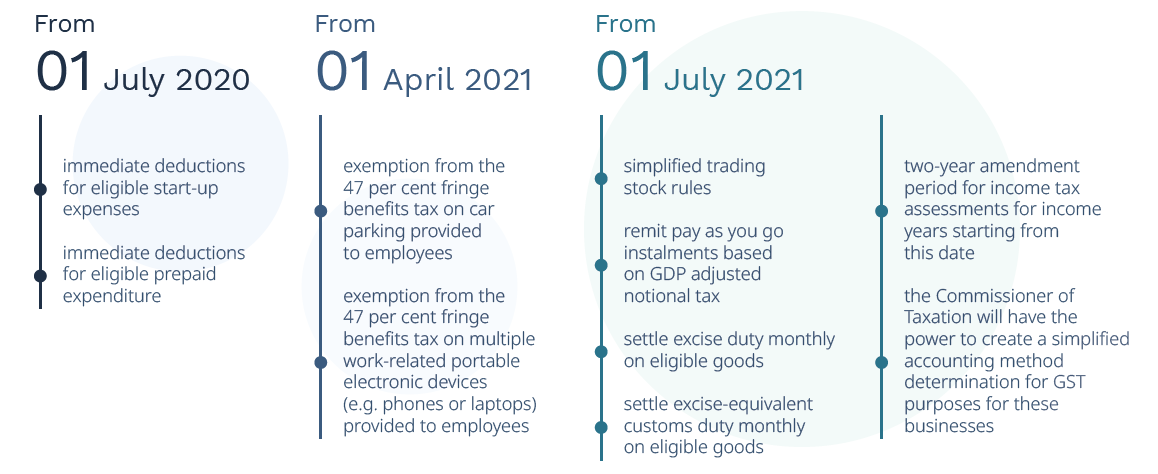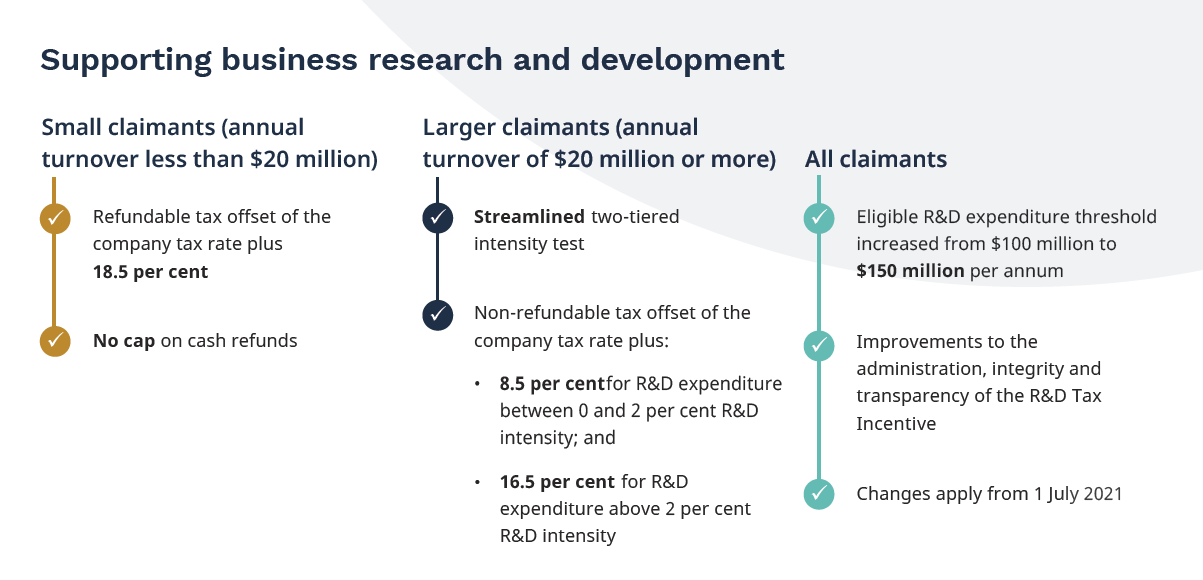The Budget has introduced temporary measures intending to stimulate business investment and deliver further cash flow benefits.
Key insights
- To assist eligible businesses impacted by COVID-19, temporary tax loss carry-back measures have been introduced to offset losses against previous taxes paid, which will result in tax refunds.
- The government is backing business investment through the introduction of a temporary full expensing initiative. Eligible businesses can deduct the full cost of eligible depreciating assets until 30 June 2022. Full expensing will stimulate investment from its announcement, supporting economic activity in 2020-21 and onwards until the measure concludes.
- The government is exempting employer-provided retraining activities from FBT. It will encourage businesses to retrain and redeploy their workers to new roles within the business.
Company loss carry-back
Corporate tax entities with an aggregated turnover of less than $5 billion will be allowed to
carry- back tax losses generated in the 2019-20, 2020-21 or 2021-22 income years to offset
previously taxed profits in the 2018-19 or later income years effectively allowing tax previously paid to be refunded.
The carry-back rules will be implemented by way of a refundable tax offset that is generated in the year the loss is made. However, the offset for the 2019-20 income year can only be claimed on
lodgement of the 2020-21 tax return effectively delaying, by a year, access to the benefit of the
carry back of 2019-20 losses.
The tax refund available is limited to the carried back amount not exceeding the earlier taxed profits and will be effectively capped at the balance of a company’s franking account to avoid generating a franking account deficit. In addition to providing cash flow support to previously profitable businesses that have a tax loss position as a result of COVID-19, this measure will also support the incentive for companies to invest in assets eligible for the full expense measures (see below). The application of the carry-back rules will be optional, and companies can continue to carry
forward tax losses under the existing tax loss provisions.
Temporary Full Expensing
In the Budget, the Federal Government announced the introduction of a temporary tax incentive which builds on the enhanced instant asset write-off.
From 7:30pm (AEDT) on 6 October 2020 until 30 June 2022, businesses with turnover up to $5 billion will be able to deduct the full cost of eligible depreciable assets of any value in the year they are first used or installed ready for use. Due to the turnover thresholds, large capital-intensive industries, such as those in the mining and metals sector, will not be eligible. The cost of improvements made during this period to existing eligible depreciable assets can also be fully deducted.
Full expensing for second-hand assets will be limited to businesses with aggregated turnover of less than $50 million. The previous enhanced $150,000 instant asset write-o will continue to be available for eligible businesses, who will have an extra six months, until 30 June 2021, to install those assets or use them for the first time.
Fringe benefits tax measures.
The Government will introduce a specific FBT exemption for retraining benefits provided to redundant or soon to be redundant employees. Without this measure, FBT would apply at a rate of47 percent effectively doubling the cost of providing retraining benefits. In a potentially significant win for the reduction of FBT administration costs, the Government will provide the ATO with increased powers to allow employers to rely on existing corporate records rather than the current prescribed declarations and other records employers and sometimes employees must maintain. This measure will apply from the FBT year commencing 1 April after the enabling legislation is enacted.
State business assistance grants to be NANE income
State government Covid-19 business assistance grants that would otherwise be assessable are will be treated as Non-Assessable Non-Exempt (or NANE) income. This brings the treatment of State grants into line with the Commonwealth Cash Flow Boost payments that were similarly treated as NANE income. Initially limited to the Business Support Grants announced by the Victorian Government on 13 September 2020, the treatment will be extended to similar programs for small and medium businesses facing similar circumstances to Victorian Businesses via a regulation making mechanism. The measure is limited to grants made before 30 June 2021.


General Advice Warning
The material on this page and on this website has been prepared for general information purposes only and not as specific advice to any particular person. Any advice contained on this page and on this website is General Advice and does not take into account any person’s particular investment objectives, financial situation and particular needs.
Before making an investment decision based on this advice you should consider, with or without the assistance of a securities adviser, whether it is appropriate to your particular investment needs, objectives and financial circumstances. In addition, the examples provided on this page and on this website are for illustrative purposes only.
Although every effort has been made to verify the accuracy of the information contained on this page and on this website, Chan & Naylor, its officers, representatives, employees, and agents disclaim all liability [except for any liability which by law cannot be excluded), for any error, inaccuracy in, or omission from the information contained in this website or any loss or damage suffered by any person directly or indirectly through relying on this information.


Recent Comments